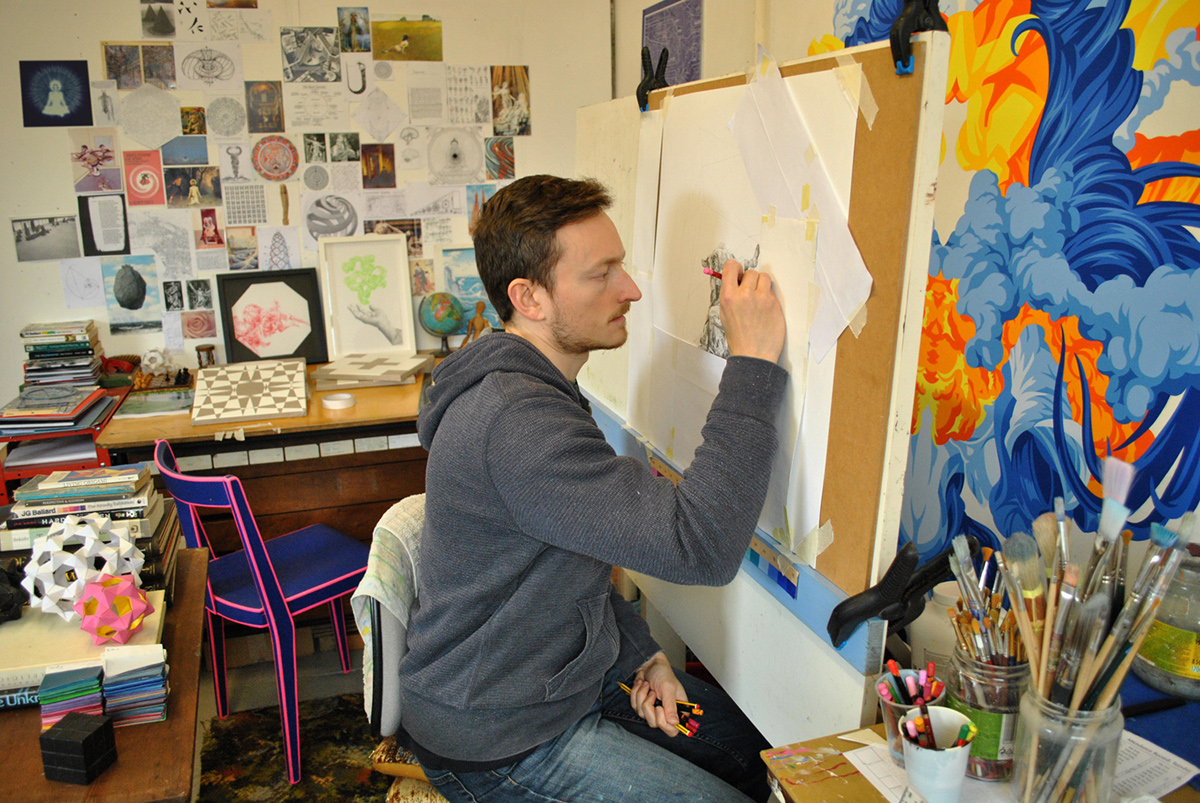
Working on 'Vertex Transitive I' in studio
2015
Introduction
In 2005 I left University at the age of 24 only to realize that during the previous 6 years in arts education I had learned next to nothing about what it actually takes to be a professional artist and how to sustain my future career. Now, after 10 years (and a lot of mistakes) I by no means have it all worked out, but the following information is some of what I have learned and what I personally would have found useful to know myself early on in my career. Hopefully this will help you, even if you only take away one or two bits of advice to apply to your own practice. This is meant for those who are just starting out so some things may seem obvious but I know everyone has blind spots so I wanted to just cover the basics.
Please note, I'm predominantly a painter so any work in the field of illustration I've done has come through being approached not via an agent. I haven't sought out commercial work so I wouldn't really be able to give any comprehensive advice on how to pursue that line of work specifically, but most of the information below should still apply regardless. There's some helpful links in the resource section at the end which you will no doubt find useful.
Being an artist is an ongoing process of learning and readjusting, especially in the fast changing world we live in, so this advice has changed over time and will again in the future. I will be updating this whenever I feel I have anything to add or alter. If there is anything you'd like me to add or any questions please message me.
Thanks again to everyone for your comments and support, this is a chance to give something back after 10 years as a professional artist, as well as recently reaching 150,000 followers here on Behance!
all the best
James R.
Last updated: 21st December 2019
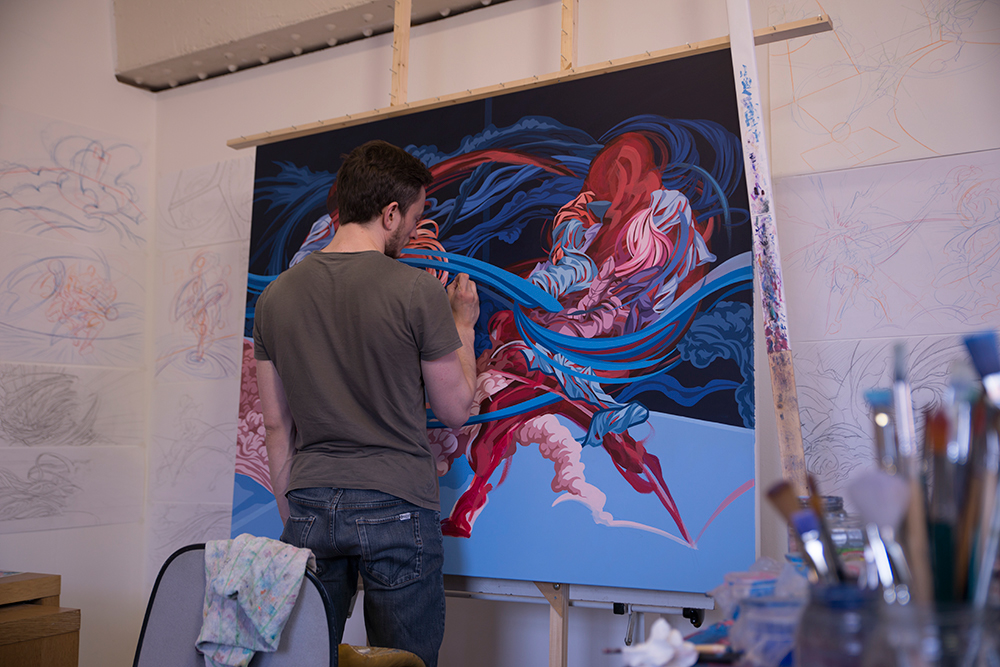
Work in progress on 'The Dual' for the Jordan Super.Fly V collaboration
2016
"As long as you can start, you are all right. The juice will come."
Ernest Hemingway
Work, work, work
To help you do that I'd advise looking at as much artwork/illustration/design as you can, the easiest way is online through sites such as Instagram, here on Behance or Booooom. This will help you see the standard of work out there and what level to aim for. It will also give you ideas you can adapt into your own work - don't be afraid to steal small ideas, as long as you adapt them into your own personal style.
Firstly, you will need to work extremely hard in order to produce original, bold and interesting work. This may seem obvious but I all too often see artists producing work that comes easily to them, with little effort, doing work they enjoy, and wonder why nobody cares. Producing great work is never easy, it's a struggle and you won't always enjoy it. If you want to be an artist to have an easy life, look cool or to make money, stop now, you're in the wrong game.
I've always had the belief that if the artwork you produce is good enough it will eventually find it's audience. Unfortunately I can't help you do that except recommend that you work at it. Always seeking to improve consistently and intelligently. Believe in your work, but don't be naive. Be your own worst critic. You wont improve if you think you're doing everything right, even if things are going well. Always seek to improve and strive to create high standard, great quality work. Aim big.
To help you do that I'd advise looking at as much artwork/illustration/design as you can, the easiest way is online through sites such as Instagram, here on Behance or Booooom. This will help you see the standard of work out there and what level to aim for. It will also give you ideas you can adapt into your own work - don't be afraid to steal small ideas, as long as you adapt them into your own personal style.
Overall working methods
If you choose to express your ideas through a number of different mediums or styles (as I have done), make sure each project you work on is very strong in and of itself. If you spread yourself too thinly the effect as a whole may diminish, but if you're willing to put the work in it allows for a more varied and interesting career. The downside is it can confuse your 'brand' and collectors of your work can't buy into your style and body of work as a whole. So I'd advise you to concentrate on your strengths. Try to choose one medium and/or subject and stick with it. Seek to improve your skill level gradually and consistently over time. Make it your own. This way of working will help you develop that strong visual style people can recognise you by and helps you to establish a core fan base.
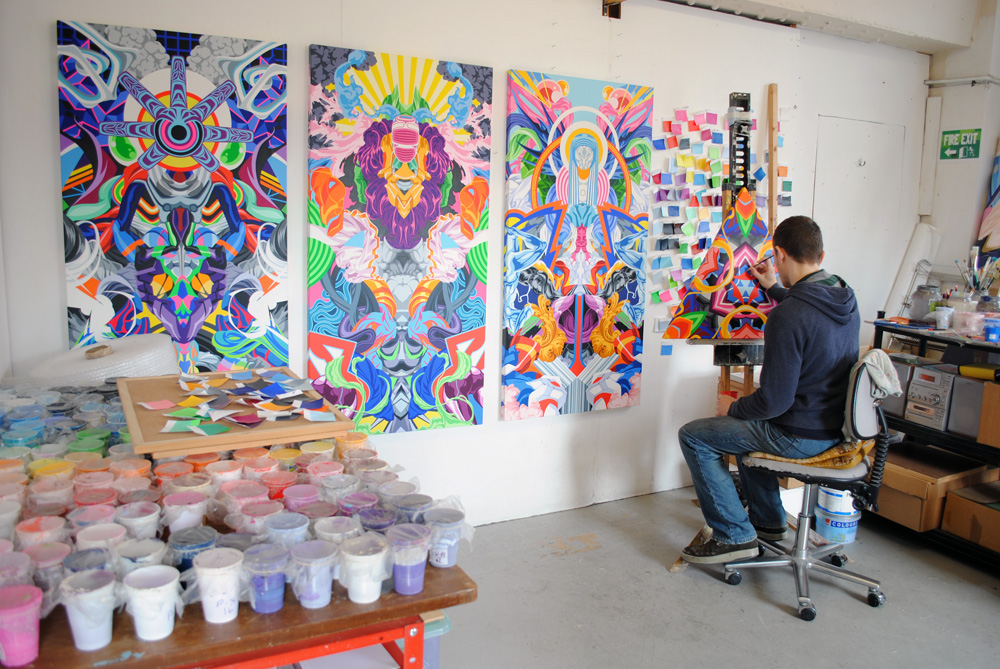
Working on 'Tesslar III' and Kiazmus series in studio
2012
"All of my biggest wins have come from leveraging strengths instead of fixing weaknesses."
Tim Ferriss
Online
I've pretty much built my career from an online presence. For someone like myself who was terrible at 'real life' networking it has been vital and helped hugely in getting my career off the ground. Myspace is where I initially gathered momentum, but things have changed a lot since 2005! So I'd recommend setting up a Instagram, Facebook, Twitter account, Tumblr blog and Pinterest page (if you produce video work you may also want to post to TikTok) specifically for your work. Use the same username for each account, for example all my social media accounts are jamesroperart. Use hashtags wisely, people search social media using them so they can really help you gain followers, you can see how I do this on my Instagram page: instagram.com/jamesroperart
I'd stress that if you make a website you need to make it easy for people to save and copy images from your site (don't go putting 'watermarks' over images of your work, if your style is strong enough everyone will know who made it). Keep it simple. Make sure it is easy for people to link directly to the images on your website, via image sharing sites like Tumblr, if not you miss out on a huge amount of free exposure. I use the Adobe Photoshop package where you also get an online Portfolio site: jamesroperart.com It's very easy to use. Wordpress, Wix and Squarespace also offer easy and relatively cheap ways to build a good professional website, but I found the formats weren't really optimal for displaying artwork. Cargocollective.com (example site: iamgabz.com) or Otherpeoplespixels.com (example site: shawnhuckins.com) which are specifically built for artists are also good, though I haven't used them personally, it's also a little cheaper. I've noticed quite a few successful artists just using a Tumblr blog instead of a website so that works also to start off with.
I would suggest joining Behance.net (I'm not being paid for this, honest!). I've had most of my illustration work come as a result of my work being seen on Behance, but that only happens if they publish your work on the 'Featured' pages where thousands of people will see it. Your work has to be of a high standard to get on there, so again, work at it.
Offline
Get some business cards printed (I get them done at Moo.com, good quality and cheap with a multiple image option) and take them with you everywhere, you never know who you might meet sat next to you on a plane or at a social event. Get to know the people you meet who seem interested in connecting, follow them on social media, send them a message so they remember meeting you, that business card may get accidentally lost!
Offline
Get some business cards printed (I get them done at Moo.com, good quality and cheap with a multiple image option) and take them with you everywhere, you never know who you might meet sat next to you on a plane or at a social event. Get to know the people you meet who seem interested in connecting, follow them on social media, send them a message so they remember meeting you, that business card may get accidentally lost!
Prints and Merchandise
You can print and sell your work on multiple products on a few sites but I'd recommend using Society6.com or Inprnt.com (for just prints) as they're well established. Use Liveheroes.com if you want more clothing options.
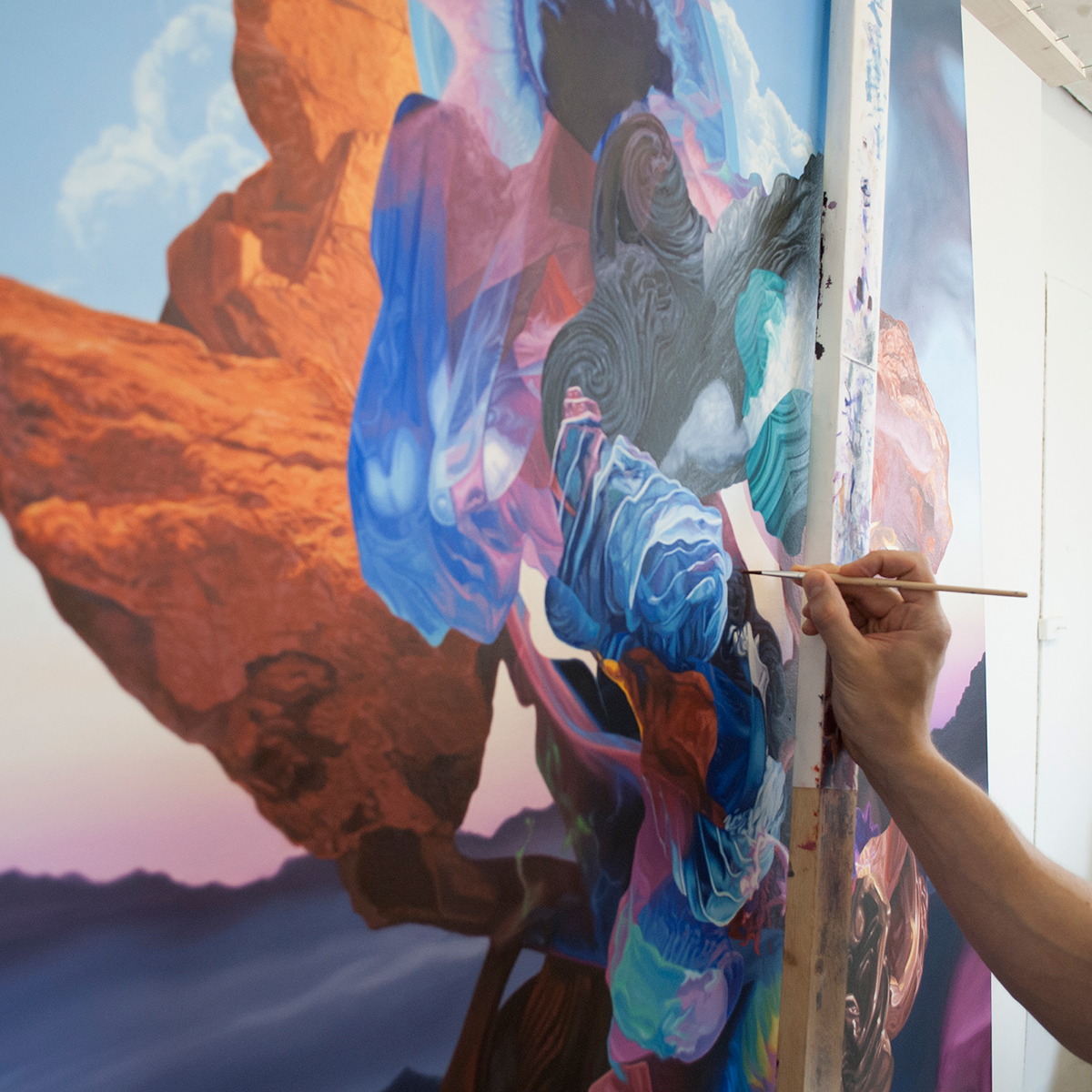
Work in progress on 'Metanoia III'
2016
"Make mistakes of ambition and not mistakes of sloth. Develop the strength to do bold things, not the strength to suffer"
Niccolò Machiavelli
You are your own boss, act like it
Be consistent. Self discipline is key. Being your own boss is not easy. It's all too easy to not do work as a freelancer when you don't have a boss looking over your shoulder, even when you know if you don't put the hours in you'll jeopardize your career. It can also go the other way and you end up working too much and don't know when to stop which can be unhealthy - although sometimes it is necessary to succeed.
Don't underestimate how hard it is to make an impact in the art world with the constant avalanche of great work that's being produced all across the world. I can't stress this enough, hard work really does pay off eventually. But again, do so intelligently.
Understand your own working rhythms. If the creative juices flow best at night that's when you should be working. But I suggest trying to fit into a 9 to 5 time slot as much as you can. Being in sync with everyone else is a lot more helpful. Don't be afraid to work into the early hours though if you've got into a good flow with your work (or if you have a deadline to hit!), sometimes it's hard enough to even start working so don't deny yourself if it's coming naturally, just try not to make it a habit.
Stop consuming, start producing!
Don't confuse laziness or procrastination with the creative spirit, sometimes that 'research' into film trailers on Youtube until 2 a.m. is just an excuse to not do the hard work. Even motivating research into other artists work or books and blogs about becoming a better artist can sometimes be just another way of putting off getting the real work done. Stop consuming, start producing.
Being an artist is 99% hard work and 1% talent. That 1% may be the vital ingredient that catalyzes the other 99% but you certainly can't rely on talent alone. Having said that it's also 100% about luck too, but all that hard work will increase your chances of being lucky.
If things get hard always remember, calm seas do not make great sailors, Arnie didn't get big muscles from lifting easy weights and diamonds are only formed under extreme pressures. If it get's hard, good, it shows that you're progressing and not stagnating. Don't be afraid to fail, but it's also vital that you learn from your mistakes. Having said that try not to seek out hard times, they will come of their own accord whenever you work hard at something. Don't self-sabotage. Again, be intelligent, always be self-aware.
Keeping Track
Time yourself and keep note of how many hours you're doing. You need to know how long you've been working if you're on an hourly rate or to get an idea of how much to charge for a piece of work, and also how long something similar may take you to do in the future.
I use this stopwatch when working on my laptop: click here.
Keep an inventory of your work, including: The date a piece was made, price (how much you asked for and how much it sold for, a 10% discount isn't uncommon for gallery sales), who a piece sold to, size, medium, which gallery currently has it and how long for etc.
Set up a spreadsheet for your accounts, keep track of what goes in and out. Keep on top of it, maybe once a week go through your receipts and invoices - personally I just input them as and when I get them - just don't let them pile up, otherwise they will become too daunting to face and a nightmare to sort through!
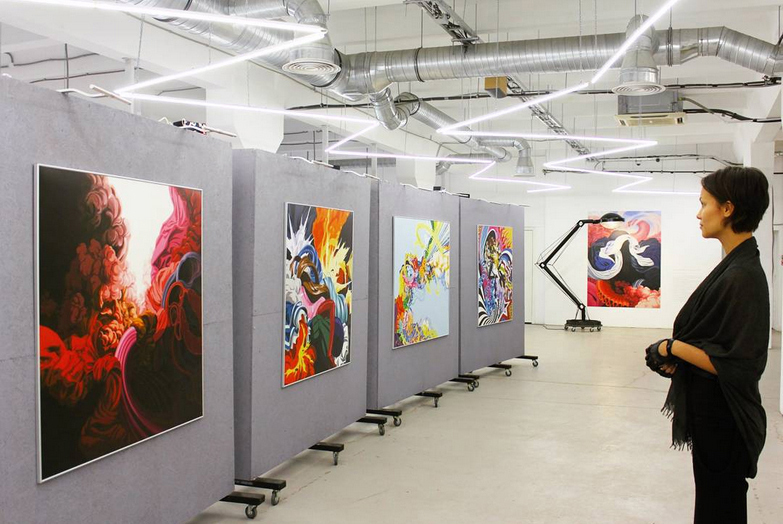
'Neuroaesthetic' - solo show of large scale prints at SHTAB in Kazan, Russia
2015
Representation, Agents and Collectors
Should you get representation from a gallery or agent, treat them like family (that goes for collectors too). They are what sustains you and your career, don't take them for granted. But don't let them walk all over you either, you're the one producing the work that makes them money.
Galleries have a tendency to hold onto artwork indefinitely unless you state clearly before you send it to them how long they can have it. You don't necessarily need to sign contracts but make sure you establish terms before sending them your work. 6 months is a good period which you can then extend to maybe a year if they are attending art fairs.
If a gallery wants to send work back from overseas, such as U.S. to U.K. as I have done in the past, make sure you're aware of the 20% charge for tax and duty that you will get hit with. If you want to know more specific details on sending work abroad, specifically from or back to the UK please message me.
Keep collectors, whether they are buying large paintings or small prints, in the loop. Put together a mailing list of anyone who contacts you interested in your work. It also helps to section them out into what they inquired about specifically so if you feel a project needs to be targeted to a specific group in a specific way it will be easier to do so.
Use MaiChimp to send professional looking emails and to put a Mailing List Subscription box on your website (example: mailchi.mp/jamesroperart)
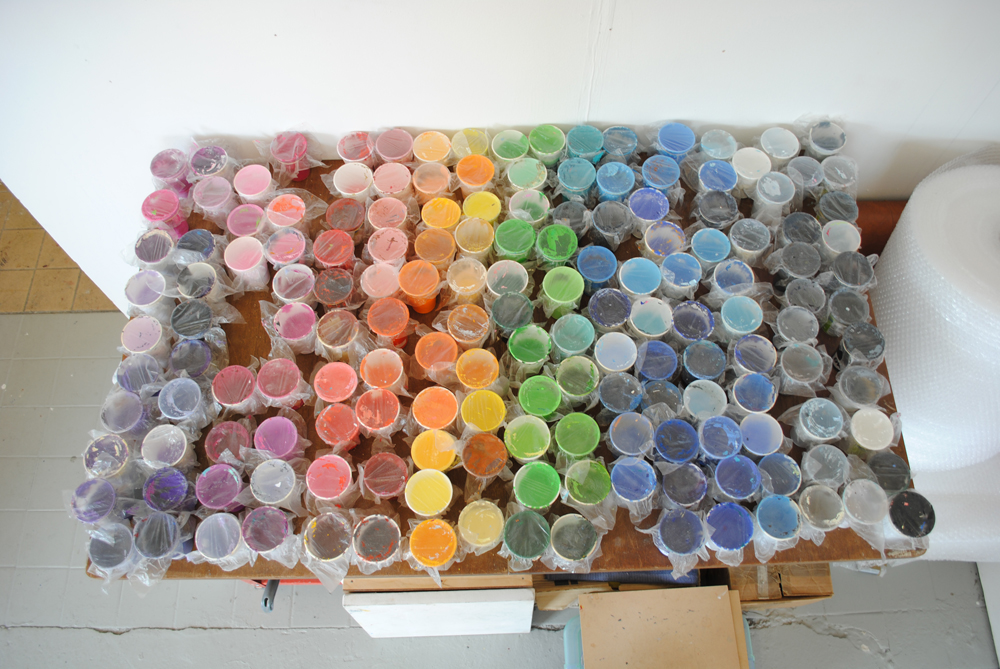
Acrylic paint colour pots in studio
2012
"The purpose of life is to be defeated by greater and greater things."
Rainer Maria Rilke
Staying balanced
Exercise, eat well and get a good nights sleep. Don't neglect keeping your body and mind healthy.
Look into a simple meditation practice, a lot of very successful people have one: David Lynch, Martin Scorsese, Paul McCartney, Jerry Seinfeld, Tim Ferris, Ray Dalio (he's a billionaire) etc. etc. Find something that suits you. This is how I do it:
Offline
Don't look at your emails, Twitter feed, Facebook page etc. just before you go to bed, you wont sleep well if you're thinking about what you need to reply to in the morning. Give yourself at least 30 minutes to an hour before going to sleep to wind down, away from any technology.
Answer emails just once or twice a day. Turn off all notifications. It's been proven that we all get a small dopamine hit in our brains every time we get a new email, Facebook, Instagram message or 'like' notifications on our phones or computers because humans crave new information, novelty, reward etc. This constant checking throughout the day, which inevitably leads you off in other directions online, adds up to a large amount of wasted time and interrupts your productivity. Don't be a dope addict, turn them off now.
“Passion has little to do with euphoria and everything to do with patience. It is not about feeling good. It is about endurance. Like patience, passion comes from the same Latin root: pati. It does not mean to flow with exuberance. It means to suffer.”
Mark Z. Danielewski
Good posture
This is very important. I developed lower back pain after years of bad posture while painting and working at the computer, I had to go to an osteopath to treat it. Correct it now before it's too late. Get those shoulders back and relaxed, lift the chest and think about where the tension is in your body. Meditation will helps with this, you'll sometimes be shocked, when your shoulders relax and drop a good 2 inches, how tense you actually are and how much energy you're needlessly wasting.
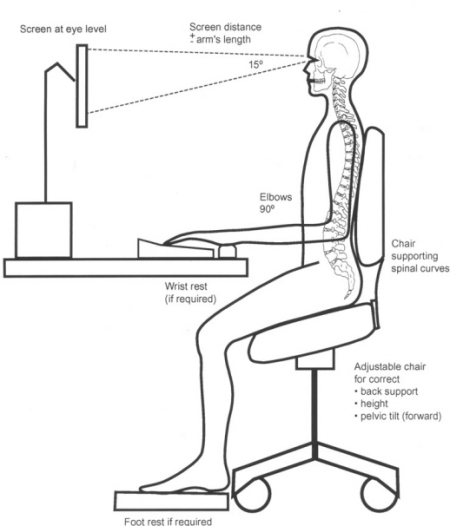
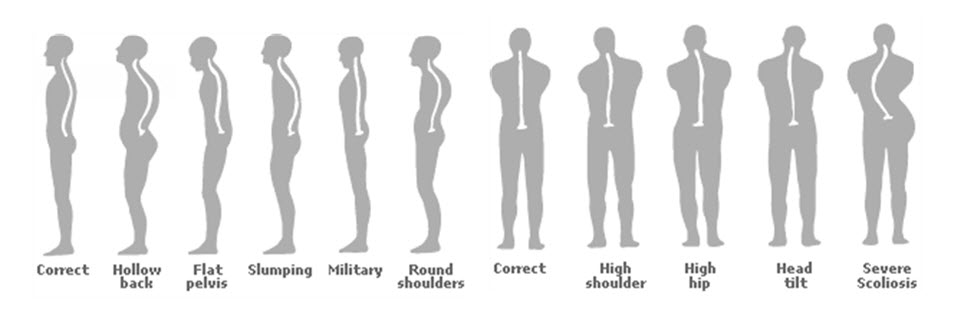

Colour swatches on studio wall for 'Lixxil'
2012
“The sure sign of an amateur is he has a million plans and they all start tomorrow.”
Steven Pressfield
Reading list and other resources
'The War of Art' / 'Turning Pro' / 'Do the Work' by Steven Pressfield - Absolutely essential reading for any artist or creative.
'Mastery' by Robert Greene
'The 4 Hour work week' by Tim Ferriss - His blog and podcasts are full of great information: fourhourworkweek.com/blog
Anything by Seth Godin: sethgodin.typepad.com
What Should I Charge? How to Justify Your Freelance Rates
Feel the Feels: A Guide to Feeling Less Alone as a Freelance Artist
'The War of Art' / 'Turning Pro' / 'Do the Work' by Steven Pressfield - Absolutely essential reading for any artist or creative.
'Mastery' by Robert Greene
'The 4 Hour work week' by Tim Ferriss - His blog and podcasts are full of great information: fourhourworkweek.com/blog
Subscribe to his mailing list and get free content: click here
'The Art of Learning' by Josh Waitzkin
'Seven Days in the Art World' by Sarah Thornton
Anything by Seth Godin: sethgodin.typepad.com
Great advice from James Victore
Great advice about promoting your work via social media from Gary Vee (as an artist you are a brand, whether you like it or not!)
* * *
Good articles on becoming Freelance:
What Should I Charge? How to Justify Your Freelance Rates
Feel the Feels: A Guide to Feeling Less Alone as a Freelance Artist
* * *
A good video on how to develop an effective artistic practice:
Illustration agency submissions (UK):


